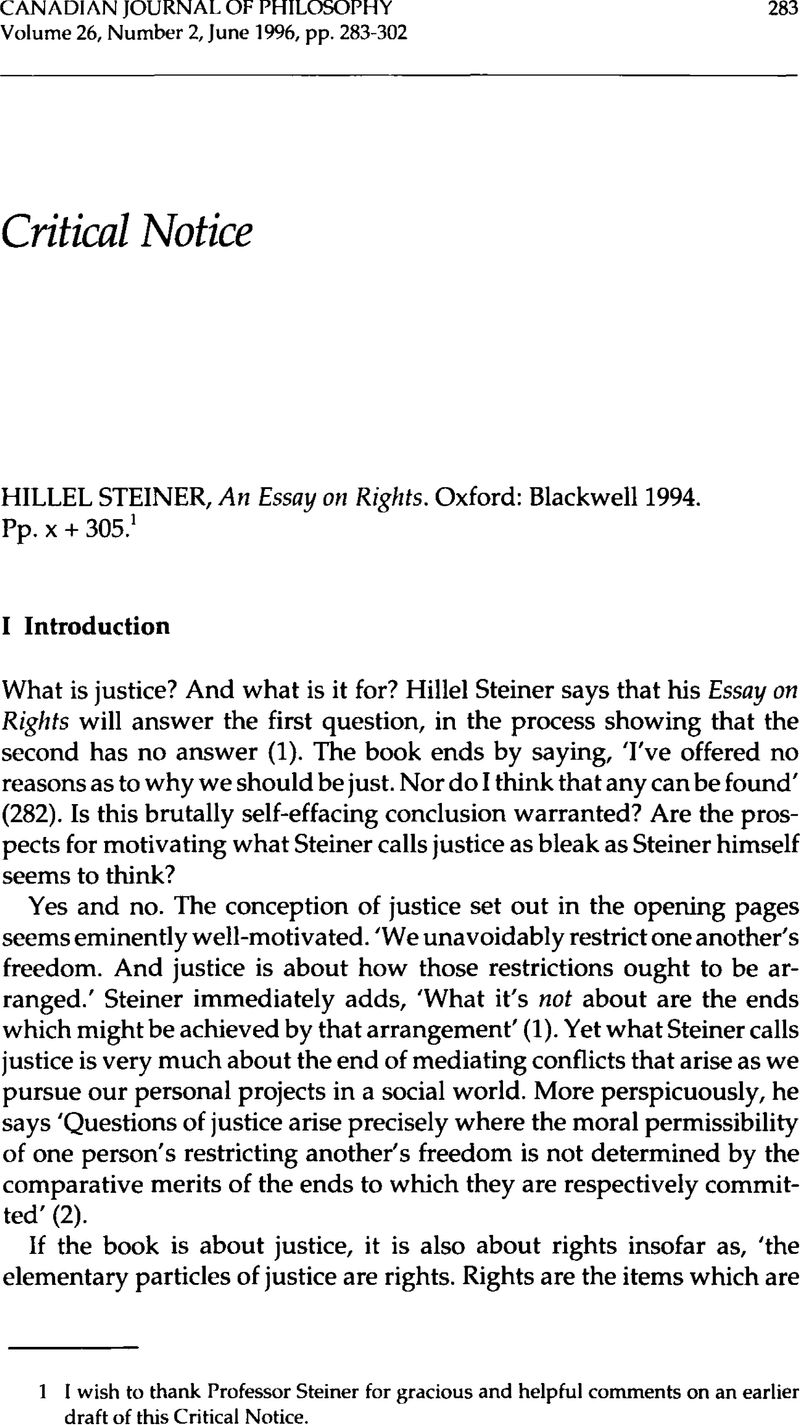Article contents
Hillel Steiner An Essay on Rights. Oxford: Blackwell 1994. Pp. X + 305.
Published online by Cambridge University Press: 01 January 2020
Abstract

- Type
- Critical Notice
- Information
- Copyright
- Copyright © The Authors 1996
References
1 I wish to thank Professor Steiner for gracious and helpful comments on an earlier draft of this Critical Notice.
2 The ceteris paribus clause is meant to set aside cases in which I become free to fetch a can of beer but at the same time become unfree to fetch a can of my neighbor's beer. We might add that there are cases where, in becoming free to do an act, I also become obligated to do it. When I suddenly acquire the option of helping to push my neighbor's car out of a snow bank, I am less free in virtue of no longer having the option of permissibly spending my time in more pleasant ways. (Or does my neighbor have to make me physically unable to spend my time in other ways in order to make me unfree?)
3 That is to say, the option of jumping from Blue's third-floor office window presumably is worthless. I am not saying this value necessarily is zero. (It could even have positive value in a case where threatening to jump would put Blue in a better bargaining position.) The point is only that it need not be -9.
4 Steiner would say the latter (personal communication, cited by permission).
5 I thank Michael Nichols and Robert Hood for helpful discussion.
6 As Steiner uses the term, if rights are compossible, it isn't just that people can avoid having their rights get in each other's way. Rather, they could not put their rights in each other's way even if they tried (89).
7 After mentioning an analogous proposal (in the context of interpersonal conflict) to do away with rights altogether, Steiner says, ‘Since the reasons for rejecting such a reform can only be moral rather than philosophical, I shall leave aside any further consideration of it here’ (82).
8 Steiner replies: Surely the assignment of categorical status to a commitment implies that the assignor has already anticipated the possibility of its conflicting with other commitments (personal communication, cited by permission). Perhaps Steiner is right. (If anything is clear, it is that reasonable people can disagree on the subject of moral dilemmas.) My view, though, is that a person could with utmost sincerity make two unconditional promises, not noticing the extremely remote possibility of their coming into conflict. As I see it, the unnoticed and extremely remote possibility of conflict does not change the fact that the two commitments are unconditional.
9 Another way to duck the question would be to claim that, if Blue forgives us for breaking her arm in the course of preventing a train wreck, then it retroactively becomes the case that we did not violate her rights. (Really? Suppose we steal her silverware and she forgives us for that too.) In any case, however many ways there may be of ducking the question, we still need an answer to it.
10 Incidentally, latecomers get most of the benefits under this regime, despite having officially been left to fend for themselves. Under the regime implied by the third alternative, the later they show up, the luckier they are. People who show up really early get to forage for nuts and berries, in the snow, with their bare hands; whereas we know from our own experience, people who show up late enough get refrigerators, hot running water, and pizza delivery. See Schmidtz, David ‘The Institution of Property,’ Social Philosophy and Policy 11 (1994) 42–62CrossRefGoogle Scholar.
11 Steiner would not prohibit our selling ourselves into slavery, though. Our right to ourselves is no exception to the rule that all rights are waivable.
12 Another way to look at it is to say children are self-owners from the start, but their self-ownership is temporarily encumbered by legitimate interests of parents. I thank Cecilia Nalagon for this suggestion.
In any case, parents are not owners of their children. They are not at liberty to dispose of their children. Perhaps they are stewards. Their mandate is to do what they think is best for the child. Part of what is involved in carrying out that mandate is relinquishing control to the child as the child becomes capable of making his or her own decisions. And if parents do not carry out that mandate in good faith, they lose it; other adults (and the child too, I would say) acquire the right to remove the child from the parents’ custody.
13 Steiner says it would (personal communication, cited by permission).
14 Suppose I own six acres of downtown Manhattan and the time comes for me to give up the value of two undeveloped acres. Do I have to give up the value that two acres would have now? Or do I give up the value that two undeveloped acres had centuries ago before the area was settled? If the latter is what a pro-rata equal share of natural resources is supposed to be about, then most of us get the equivalent of that by the time the doctor cuts our umbilical cords. If the former, then what the latecomer is really asking for is not a slice of natural resources, but rather a slice of an economy the overall value of which is more a function of other people's labor inputs than of natural resources.
- 11
- Cited by




